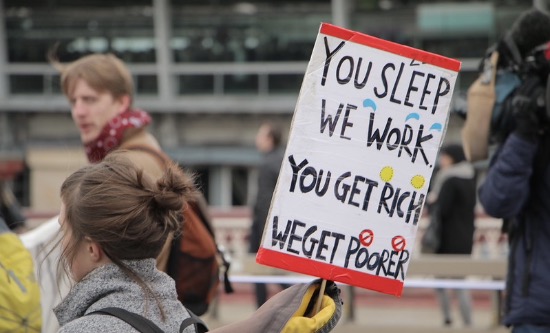
‘This virus is the great equaliser’, Governor of New York Andrew Cuomo once claimed about coronavirus, as did the pop star Madonna. But the opposite is true. The Joseph Rowntree Foundation warns that in Britain, ‘Four in ten workers on the minimum wage face a high or very high risk of losing their jobs, compared with 1% of workers paid more than £41,500 a year.’ The youth, the poorest and oppressed sections of the working class – women and ethnic minorities – receive third-rate relief and are forced to keep working or get the sack, while better off layers, whom the ruling class is counting on for political support, are riding out the pandemic in business class. WILL HARNEY reports.
If Britain was already one of the most unequal developed countries when the pandemic hit, the response of the capitalist state has been to entrench that inequality. As the virus ran out of control large parts of the economy were forced to shut down, threatening millions with unemployment. In January 2021, Chancellor Rishi Sunak announced that since the start of the pandemic 10 million workers have been furloughed on the Coronavirus Job Retention Scheme (CRJS), with the state underwriting 80% of their wages. But this targeted subsidy for businesses has been parcelled out unequally, and it has not prevented the loss of a record 812,900 jobs between February-November 2020 (Office for National Statistics). Better-off and older layers of Britain’s working class have found themselves protected, while the poorest, the young and the most precarious are paying the price of failure.
According to the Institute for Fiscal Studies (IFS), sectors with younger workforces and the most unstable, lowest-paid jobs were among the most furloughed in April and May 2020, and a Trades Union Congress (TUC) analysis found that these sectors also suffered the worst job losses between February and November 2020: the accommodation and food services sector had 52% furloughed, 297,000 (14%) jobs lost; and the arts, entertainment and recreation sector had 53% furloughed, 90,000 (15%) jobs lost. Less than 20% of these service sector workers were able to work from home.
Black, Asian and other minority ethnic (BAME) workers make up a significant proportion of those working in the lowest-paid and insecure sectors hit hard by lockdown. They are the first to lose their jobs. The TUC reported that between Q3 2019 and Q3 2020, the number of BAME part-time workers fell by 15% (163,000) and the number of BAME full-time workers fell by 2% (49,000). In the accommodation and food sectors, around a quarter of BAME workers have lost their jobs (compared to 14% overall in that sector). By October BAME workers were already facing an 8.5% unemployment rate (26% for BAME youth), compared to 4.5% for white workers and 4.9% for all workers.
Not all workers are equal
Those with higher-paid jobs were more often working from home, were less likely to have been furloughed or lose their jobs, and if they were furloughed, were more likely to be topped up to full pay by their employer. In the IFS’ Deaton Review of Inequalities for 2020, we learn that ‘The COVID crisis has exacerbated inequalities between the high- and low-paid and between graduates and non-graduates’. The incomes of middle-class professionals, public sector workers and skilled technical workers have been shielded for now:
Between August to October, when a record 370,000 jobs were lost, workers under 26 were more than twice as likely as older workers to have lost their jobs with the youth unemployment rate reaching 14.5%, and most were on reduced income. Meanwhile, most pensioners surveyed by the IFS reported no financial impact from the pandemic, and a fifth said their financial situation improved.
The IFS paper ‘The economics of lockdown’ finds that ‘poorer households [are] taking large hits to their earnings while rich households experience large (proportionate) reductions in their consumption along with higher savings’. The Resolution Foundation also found that families on higher incomes were saving money by working from home and spending less on luxuries and transport. These changes to consumption are unavailable to poorer families, who spend a much larger proportion of their income on necessities.
In the finance and insurance sector 29% of workers were furloughed in April-May, with 1% losing jobs in February-November; and in professional activities 24% were furloughed in April-May, with 3% losing jobs in February-November. Around 60-70% in these sectors worked from home in April 2020. More than half of workers (57.2%) in London worked from home; in every other region, less than half did.
Skilled technical workers in construction, engineering and utilities were furloughed in the highest proportions and had the fewest homeworkers, but few lost their jobs; besides employing a key political constituency of ageing workers, these are sectors where the expense of training means preserving existing ‘human capital’ is prioritised.
Women shoulder the burden
As the government’s failure to control the virus has forced closures of schools, and without adequate state support, families have experienced the greatest privatisation of childcare in a generation. The IFS shows that, going into the pandemic, women were especially vulnerable: 20.3% of households with dependent children are headed by lone mothers as against 3.3% headed by lone fathers. So, in 2020, when childcare increased from an average 25 hours per week per household to 41 hours per week (equivalent to a full-time job), women’s share of this increased from 17 hours to 26.5 hours. And while a greater proportion of women were furloughed than men, a smaller proportion received top-up wages from their employer.
The poorest workers, the youth and oppressed have only two choices: stay in ‘economy class’; or fight our way to the front and commandeer the train.
Fight Racism! Fight Imperialism! 280 February/March 2021




